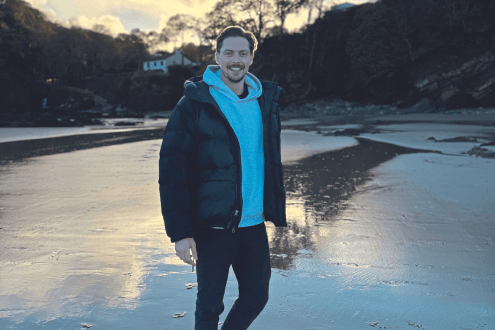What’s it really like to get your novel published?
Our Associate Editor, Elizabeth Heathcote, explains how her journey to literary success has been punctuated by some important life lessons

Early this year, I received a call on my mobile at work. I didn’t recognise the number and was chasing a deadline, so my ‘Hello?’ was a bit grumpy. But it wasn’t just another marketing call – it was my agent, and she had news.
I listened, thanked her and rang off and then, because I didn’t know what to do with myself, I ran over to a table where several of my colleagues were deep in discussion, threw my hands in the air and said: ‘I’ve sold my novel!’ They all congratulated me, and then got back to their meeting. I made myself a cup of tea and returned to my desk.
What response would have been appropriate? I had been waiting for this day for 20 years, since I first decided I actually would write a book. No, longer – since I was a child. When I went public on Facebook and told my small world that I had a novel coming out, schoolfriends got in touch to say: ‘You always said you would do it and you have!’
I know my dream of publishing a novel is one that many people share. So, what is it like when it finally comes true?
“Success is just a point on the road”
My novel, Undertow, is the third that I have written. The second, years ago now, came close to being published, but close is not close enough. Along the way, I have started other books that have made it to chapter two or three; I have also completed a children’s novel, a TV drama, and various poems and short stories. So, plenty of false starts – or practice, depending on how you look at it.
In the early days, I was desperate to get published. When my second novel didn’t make it, I was bereft and gave up fiction for several years,concentrating on journalism, where I made steady progress and earned a salary. But I kept coming back. Whatever successes I chalked up in other fields, I would always find that feeling creeping up on me – this is what I really want to do.
Someone said, ‘You write because you have to, otherwise why the hell would you?’. For most of us, writing fiction means years of unpaid graft with the odds stacked against you ever getting published. I’ve been penny-pinching for years when I needn’t have been; if I had just given up on what sometimes felt like a pipe dream, and settled down to a full-time job.
At one point, when I was thinking about starting yet another book, I faced head-on the prospect that I may never be published and I asked myself: ‘If I knew that this was the case, would I still write?’ My answer was ‘yes’. I have one life and this is what I want to do with it. Maybe that was the biggest turning point: the day I decided I was going to find a way to live the life I wanted. And did.
“This won’t solve all your problems”
It’s so easy to slip into ‘I’ll be happy when…’ thinking, and I did that when I was younger. I was heartbroken when my earlier book failed because I’d loaded so much on to its success. I thought it would magically solve all my problems, and somehow validate me as a person. Now that I am older, I know it doesn’t work like that. Yes, success is lovely and very welcome, but it will not drastically alter my life. My wellbeing is rooted in family, good friends, hard work.
In terms of day-to-day life, I will continue to work part-time as a journalist, and part-time as a novelist – because that is what I like. Life will be a little easier, but any problems I have are not going to suddenly disappear.
I am glad now that success came later for me. In the intervening years, I have worked on my craft, learned about resilience, and realised that success in a game like this is about luck as well as skill, and may prove ephemeral.
My break came partly because my book – a domestic noir crime story in which the main character suspects that her husband killed his ex – is suddenly the most sought-after genre. But it’s what I’ve been writing for 20 years.
“Success is scary, too”
Selling my book unleashed anxiety as well as pleasure, which surprised me. Why? Well, some reasons are obvious – having laboured all these years in a bubble of myself, my friends and my agent reading my work, everybody would soon be able to, and would be vocal in their criticism, and that felt a bit like stripping naked in public.
But it wasn’t just that. Trying to understand my feelings, I read about fear of success and it was quite an eye-opener. It sounds counter-intuitive – who fears success? – but it seems quite a lot of us do. Brené Brown is brilliant on all of this. Check out her TED talk called Listening To Shame, in which she discusses her overnight rise to fame, and the dread it released. My success is modest in comparison, but I recognised those emotions.
Success is exposing, and makes life more complicated. Like many writers, I am an introvert, but now, I realised, I would need to develop a public persona, be active on social media, talk on panels… I would need to be able to deal with accountants and tax offices, to steady my ego in the face of lukewarm reviews. Gradually, I am adjusting and learning new skills.
I am told by others who have been there that it is par for the course but, for a while there, I was well out of my comfort zone.
“After it happens, life goes on”
Having said that, my dream coming true is, of course, amazing. I have moments of deep happiness and satisfaction. And I can already feel those little nudges of expansiveness that success brings. I can feel myself being that little bit more open, more generous, less grudging.
Big-bucks publishing deals are rare these days, but I can afford to buy my family some well-earned treats, and to work less. Writing the next book will feel like a more civilised affair… Only it won’t really, because producing a decent novel is nothing like the fantasy of sitting around in a garden room musing – it is really hard work.
As a novelist, the focus is always on the journey, the destination postponed until the absolute last minute, so the reader can enjoy every moment. Maybe the biggest lesson for me of my 20-year quest to fulfil my dream is that life should be lived the same way.
Undertow by Elizabeth Heathcote (Quercus, £12.99) is out now. Read the Psychologies review here.








